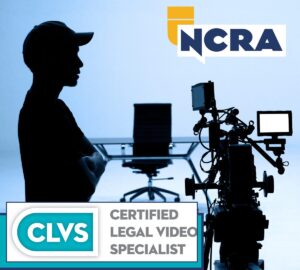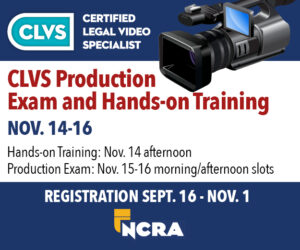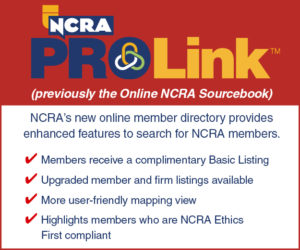By Cassandra Caldarella
Some reporters go their entire lives without earning a million dollars, so it sounds crazy that some court reporters might be able to achieve this milestone in a few short years. But it is possible. Plenty of court reporters have achieved this goal, and you can too!
Pay attention to the following tips and use them to help ramp up your revenue growth:
- Find a growing market
 One of the simplest ways to build a million-dollar court reporting business in such a short period of time is to find a growing trend and ride it to the top. Take me for example. As a former official for Los Angeles Superior Court, I saw the privatization of the reporters in civil courtrooms and getting laid off from the County as an opportunity. I went from a salaried position making $97,000 a year with the county to making more than $200,000/year. I took my lemons and made a whole bunch of lemonade. Certainly, part of my success comes from turning out a great product and service, but it also comes from timing. When I was laid off in July 2012, a $75+ million-dollar market for civil reporters in L.A. opened up and more than 12,000 attorneys in the Los Angeles market were scampering for coverage of their motions and trials. Along with many colleagues, I experienced a 125 percent annual revenue growth that first year and ever since. Finding a growing market of your own like this can put you on the fast track to massive revenue growth.
One of the simplest ways to build a million-dollar court reporting business in such a short period of time is to find a growing trend and ride it to the top. Take me for example. As a former official for Los Angeles Superior Court, I saw the privatization of the reporters in civil courtrooms and getting laid off from the County as an opportunity. I went from a salaried position making $97,000 a year with the county to making more than $200,000/year. I took my lemons and made a whole bunch of lemonade. Certainly, part of my success comes from turning out a great product and service, but it also comes from timing. When I was laid off in July 2012, a $75+ million-dollar market for civil reporters in L.A. opened up and more than 12,000 attorneys in the Los Angeles market were scampering for coverage of their motions and trials. Along with many colleagues, I experienced a 125 percent annual revenue growth that first year and ever since. Finding a growing market of your own like this can put you on the fast track to massive revenue growth.
- Think monetization from the start
It seems strange to think about monetization objectively, but some court reporters operate without any obvious monetization strategies. Twitter is one example of this phenomenon, but countless other companies out there are building up their free user bases, hoping that inspiration – and, consequently, financial stability – will strike along the way.
 Most profitable companies operate from one of two models: either they sell a lot of inexpensive products to a lot of people or they sell a few big-ticket items to a more limited buyer list. Neither model is easier or inherently better than the other. What’s more important than choosing is having a defined plan for monetization. Knowing what the plan is to make money from the start will prevent wasted time spent hoping that something profitable will come together.
Most profitable companies operate from one of two models: either they sell a lot of inexpensive products to a lot of people or they sell a few big-ticket items to a more limited buyer list. Neither model is easier or inherently better than the other. What’s more important than choosing is having a defined plan for monetization. Knowing what the plan is to make money from the start will prevent wasted time spent hoping that something profitable will come together.
For court reporters, we have some limitations: what we can charge may be limited; we can’t give away our services for free; and we can’t participate in gift giving more than a certain amount each year. To work as a pro tem in court, most of the page rates are set by the Court Reporters Board in California. One of the free user bases court reporters can set up for themselves is a vast network of referrals. So when an attorney calls requesting your services, and you are already booked, you can tell him that you have a friend who just became available. And the same goes with agencies who call you for work. It can be a mutually beneficial situation. Or, if you prefer, you can offer to cover the job for the attorney, find a reporter that you network with, and take a cut. Do whatever works best in your situation.
- Be the best
 There are plenty of mediocre court reporters out there, but the odds are good that these reporters aren’t making a quarter of a million dollars a year. If you want to hit these big potential revenues, you’ve got to bring something to the table that wows customers and generates buzz within your marketplace.
There are plenty of mediocre court reporters out there, but the odds are good that these reporters aren’t making a quarter of a million dollars a year. If you want to hit these big potential revenues, you’ve got to bring something to the table that wows customers and generates buzz within your marketplace.
How can you tell if you’ve got a “best in breed” service? Look to your current customers. If you aren’t getting repeat business from attorneys and agencies and getting rave reviews or positive comments sent to your inbox, chances are your clients aren’t as ecstatic about your service as they need to be to hit your target sales. Asking your existing customers what you can do to make your service better and then put their recommendations into place. They’ll appreciate your efforts and will go on to refer further jobs to you in the future.
Improve your skill level. Focus on getting your realtime certification and then offering realtime on every job. Get as many certifications as possible. Be a member of your national and state associations. Join the state bar associations and trial lawyers associations.
Beyond our skill level is making an emotional connection with your clients. We reporters have very little time to communicate with attorneys while we’re working. The entrances and exits are sometimes all the time we have with them. Make it count. Make eye contact. Smile. You’ll be surprised what an impact a simple smile can have.
- Hire all-stars
Hitting the $200,000 in revenue per year is no small feat. You aren’t going to achieve this goal alone and you certainly aren’t going to get there with a team of underperformers. Yes, hiring less expensive scopists and proofreaders (or none at all) will be cheaper and easier, but you’ll pay for this convenience when your end-of-the-year sales numbers come up short.
 Instead, you need to hire all-stars, and the fastest way to do this is to ask around for referrals. The really good ones will be busy and will turn you down at first. You need to use your referrals to let them know that you know someone they work with and can be trusted. Get them on board with incentives such as higher than usual rates. This will not only get them in the door, it will ensure that you have them on your team when that daily trial starts tomorrow. They will make you a priority. And treat them like gold by remembering their birthdays, sending holidays cards, gifts, and bonuses, and just by having open and direct communication with them. If you have the time to “interview” scopists and proofreaders by starting them out with small jobs to test the waters, and you find one that has potential, this could be your opportunity to turn them into exactly what you need and want by gentle coaching and instruction and slowly giving them more and more to do for you. The training you put into them will be rewarded with loyalty. You need to be absolutely certain that you can go after those all-day, realtime, same-day expedite jobs because you can rely on your team to be there when you need them. You need to be able to get those jobs day after day after day without missing a deadline. One missed deadline could be the end of a relationship with an agency or an attorney. When every penny counts towards reaching your million-dollar goals, you’ll find your team of subcontractors to be worth their weight in gold.
Instead, you need to hire all-stars, and the fastest way to do this is to ask around for referrals. The really good ones will be busy and will turn you down at first. You need to use your referrals to let them know that you know someone they work with and can be trusted. Get them on board with incentives such as higher than usual rates. This will not only get them in the door, it will ensure that you have them on your team when that daily trial starts tomorrow. They will make you a priority. And treat them like gold by remembering their birthdays, sending holidays cards, gifts, and bonuses, and just by having open and direct communication with them. If you have the time to “interview” scopists and proofreaders by starting them out with small jobs to test the waters, and you find one that has potential, this could be your opportunity to turn them into exactly what you need and want by gentle coaching and instruction and slowly giving them more and more to do for you. The training you put into them will be rewarded with loyalty. You need to be absolutely certain that you can go after those all-day, realtime, same-day expedite jobs because you can rely on your team to be there when you need them. You need to be able to get those jobs day after day after day without missing a deadline. One missed deadline could be the end of a relationship with an agency or an attorney. When every penny counts towards reaching your million-dollar goals, you’ll find your team of subcontractors to be worth their weight in gold.
 Consume data
Consume data
Finally, if you want to shoot for the revenue moon, you need to be absolutely militant about gathering data and acting on it. If you want to make $250,000 a year, then do the math. There are 2,080 working hours per year, which is $120.17/hour. There are 12 months per year, which would be $20,833 per month. And there are about 20 working days each month, which would be $1,041.66 per day, 240 days per year. As the ebb and flow of reporting goes, so go our predictable numbers, so we must constantly take measure of where we are.
I keep an Excel spreadsheet with my running monthly totals of jobs invoiced and money received ,and I put that on a side-by-side comparison of the last year’s numbers. I always know where I stand each month. If my job cancels today and I’ve only made the $300 per diem appearance fee, and I know I still have to get to my $1,041.66 goal for the day, then I text message all my agencies to let them know I’m available. I try to double- and triple-book myself, so I’ve got 3-6 motions in one day or a trial with dailies and realtime. I don’t stop until I’ve hit my goal. But then there are days where I get 5 copies and realtime and roughs, and it makes up for those days where everything falls apart. But I never stop trying to hit my daily goal. Always check your statistics to see how your day impacted your revenue. Add up your per diems and make a note of how many pages and calculate how much you earned at the end of each job. It may not be too late to pick up another one before you head home. Check your phone frequently for text messages and emails from agencies. Keep track of your key performance indicators (KPI’s) and push your metrics even higher every day. Keep a score card for yourself. Always keep your numbers in mind and know where you measure up each day.
I’m constantly picking up new agencies and making cold calls to agencies I hear other reporters talking about. I send them a resume and list of references, but I tell them what I want. I send my rate sheet, work preferences, geographical areas, and tell them about my experience. I try them out. I always invoice agencies and don’t rely on their worksheet. I know down to the penny what I earned on each job. I always negotiate rates with new and old agencies, with each job. I know what the going rates are by constantly doing market research, talking to other reporters, networking. You have a veritable gold mine of information just hanging out in the various Facebook groups, so put it to good use.
Growing your freelance court reporting business to million dollar revenues isn’t easy, but it is possible. Stick to the tips above – even if you don’t hit this particular goal, you’ll earn the strongest sales results possible for your unique business.
Cassandra Caldarella is a freelancer and agency owner from Santa Ana, Calif. She can be reached at cassarella11@hotmail.com.

























